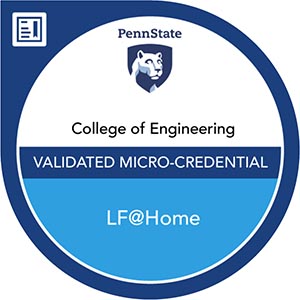Learning Factory virtual summer programs focus on diversity, professional growth
8/11/2020
By Tessa M. Woodring
UNIVERSITY PARK, Pa. — With many students losing summer internships and career development opportunities because of COVID-19, the Bernard M. Gordon Learning Factory was determined to provide these students with continuing education and professional development opportunities. In collaboration with numerous units across the Penn State College of Engineering, the Learning Factory developed two virtual micro-credential programs as part of its mission to help students “take back their summer.”
“We don’t want this to be a ‘lost’ summer,” said Matt Parkinson, director of the Learning Factory and professor of engineering design and mechanical engineering. “These micro-credential programs are designed to provide experiences that will help students develop new skills and add things to their résumés.”
The first program focuses on engineering design and making. In order to earn the “Learning Factory at Home Badge,” students must complete all five modules that are built around helping students develop technical and nontechnical skills — including interpersonal communication, leadership, design processing and creative thinking.
“The activities in the badge guide students through the development of skills vital to engineering problem-solving — communication, leadership, creativity and a bit of hands-on fun,” Parkinson said. “The combination of personal interests with engineering skills can be empowering. It helps us to see how we can be uniquely successful in our chosen field.”
The second program focuses on understanding the value of diversity and inclusion in design. The “Diversity and Inclusion Badge” consists of four modules that are designed to educate students on the issues surrounding race and diversity in the United States. Learning Factory interns Martha Christino, sophomore civil engineering student; Grace Sibley, sophomore mechanical engineering student; and Luke Pagan, sophomore mechanical engineering student; played a major role in developing the micro-credential program.
Christino expressed just how important the program’s topics are, especially for engineering students.
“There’s a saying I learned in Air Force ROTC that goes ‘mission first, people always,’” Christino said. “Engineers, myself included, can focus too much on the technical aspects of ‘mission first.’ The job of an engineer is to make the world a better place for the people in it, so to achieve the ‘people always’ part we must strive for justice and respect the dignity of every human being. This micro-credential is important for students because it’s the beginning of thinking about ‘people always’ and provides resources for students to continue to strive for justice.”
Parkinson, Christino, Sibley and Pagan collaborated with the Center for Engineering Outreach and Inclusion (CEOI) to develop content for this micro-credential program.
“CEOI was able to channel our ideas as students and help us turn a passion into productivity in order to make a difference in the Penn State community,” Christino said. “The CEOI team was able to take our ‘we have this crazy idea and want to do something’ and direct us along the path to making it happen.”
According the Parkinson, these programs are being offered throughout the summer in hopes that they can then be improved and continuously offered throughout the academic year.
“I’m hoping that students will use this time to become even more intentional about their undergraduate experience,” Parkinson said. “I hope that this will be a step toward learning on their own and then putting what they learn into action. If these micro-credentials were earned — and the principles they teach adopted — by a large number of College of Engineering students this summer, think about how different the experience would be for all of us.”




